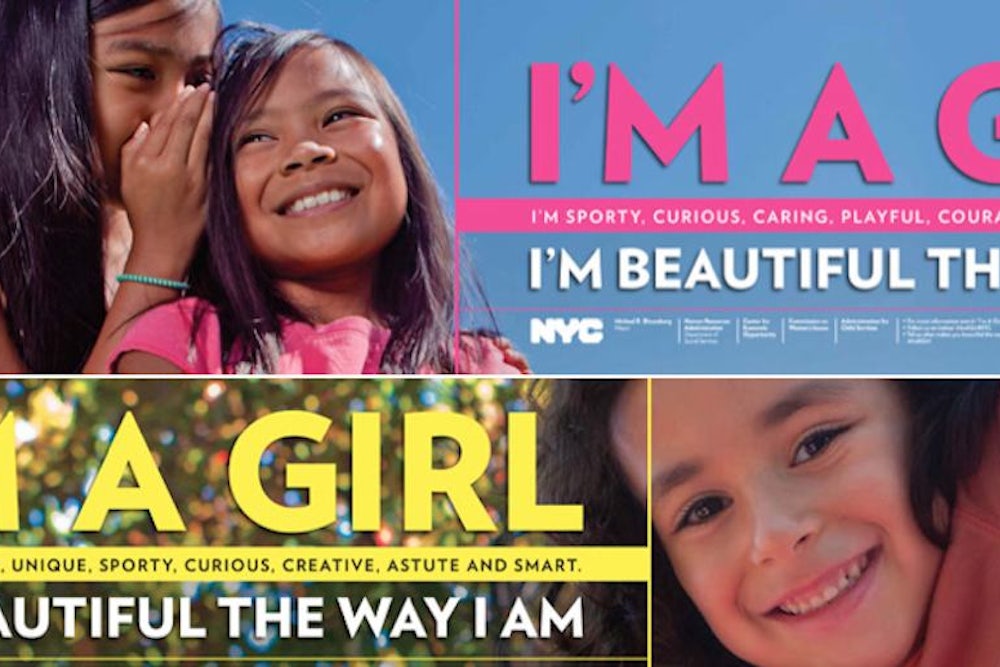In what may be one of his last hurrahs as mayor of New York, Michael Bloomberg on Monday unveiled a campaign that aims to bolster young girls’ self-esteem by telling them they’re beautiful the way they are. The $330,000 public health campaign, “NYC Girls Project,” has deployed bus and subway ads around the city depicting girls of different sizes and races and featuring slogans like, “I’m a girl. I’m a leader, adventurous, outgoing, sporty, unique, smart and strong. I’m beautiful the way I am.”
Challenging unattainable standards of beauty is a worthy goal, and the campaign has received plenty of positive feedback. Jezebel called it “uplifting” and, notably, refrained from saying anything snarky about it; others have praised its positive tone and diverse cast of girls (none of whom are professional models). But some, like Amanda Marcotte of The Daily Beast, take issue with the campaign’s use of the word “beautiful”— and the implication that beauty is what matters most.
“I fear that these ads may end up accidentally reinforcing the narrative that the ads are trying to overcome,” writes Marcotte. “The tagline ‘I’m beautiful the way I am’ ends up endorsing the larger message that ‘beautiful’ is still the highest aspiration that a woman should have.”
And Kat Stoeffel of New York mag's The Cut wrote, “There’s something slightly contradictory about the NYC Girls Project message — ‘Don’t worry about how you look. You look beautiful!’”
But there’s something even more contradictory about a campaign that purports to tackle unrealistic representations of women in the media, when it comes from a man who founded one of the biggest media companies—and when that company employs some of the most conventionally attractive female anchors on television. The female anchors on Bloomberg TV are, across the board, a good-looking bunch. MTV.com’s Guy Code Blog has even argued that Bloomberg TV has the “hottest” anchors of any channel—even more than Fox News. “Looks like New York City Mayor Michael Bloomberg knows how to pick ’em,” wrote Carl Williott.
Michael Bloomberg does not have any role in hiring Bloomberg TV's anchors. “The mayor is not involved in the day–to-day running of Bloomberg News,” said Samantha Levine, a spokesperson for the mayor and director of the Girls Project. She emailed me after our conversation to elaborate: “We are reaching out to young women—we are not telling any company or organization in any industry what they should or should not do.”
But he is the founder and 88 percent owner of Bloomberg L.P., which owns Bloomberg TV. Surely he could wield influence at the channel, if he chose to. What if Bloomberg TV hired women who, by the media and fashion industries' standards, weren't attractive or were even ugly? That would send a far more radical message: that women can be credible and successful without being beautiful. It might also be a more plausible message to tweens whose schoolyard interactions have taught them that beauty is not, in fact, universal. As Katy Waldman of Slate said, “For some girls, the slogan ‘I’m Beautiful the Way I Am’ is a lie.”
PSAs themselves are problematic. To a young person—or most people, really—the government is hardly the arbiter of what’s cool, and when it tries, it’s often counterproductive. Researchers have found, for example, that public health campaigns against smoking may trigger smokers’ cravings for cigarettes, and anti-drug PSAs may arouse viewers’ curiosity. As Shaunacy Ferro of Popular Science explained: “When anti-drug ads say ‘don't do drugs,’ they inherently bring up the implicit question ‘should I do drugs?’” The same issue could apply here: When a PSA tells you that you’re beautiful, it brings up the implicit question: “Am I beautiful?”
Girls’ low self-esteem is a real problem, and the stats the organizers cite are heartbreaking: 80 percent of ten-year-old girls are afraid of being fat; 40 to 70 percent of middle school girls are dissatisfied with two or more parts of their bodies. If Bloomberg really cares about the issue, his campaign shouldn't begin and end with these PSAs. He won’t be mayor for much longer, but as the founder of Bloomberg Media, an international media company with far greater reach than a bunch of bus and subway ads, he still has a great platform to address it.
